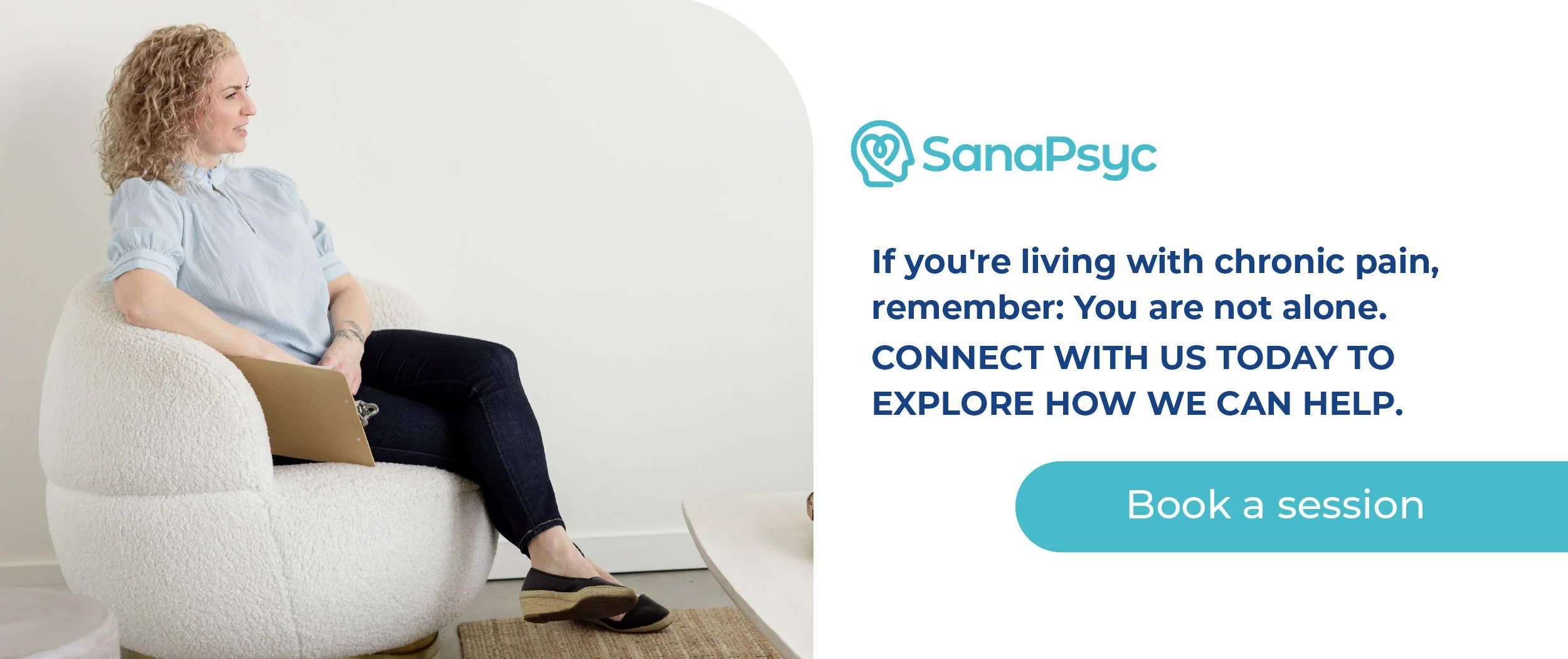Living With Chronic Pain: Tips From Best Psychological Services Calgary Therapists
Chronic Pain: Understanding Its Impact on Mental Health and Healthy Coping Strategies
Chronic pain is a condition that affects millions of people worldwide, often invisibly while people suffer in silence. While it’s often associated with physical discomfort, the effects of chronic pain and illness extend far beyond the body. For many, chronic pain is not just a physical ailment, but a complex condition that can deeply influence their mental health, relationships, work, sense of meaning and purpose, productivity, and overall well-being. Understanding chronic pain, how it impacts mental health, and developing healthy coping strategies is crucial for anyone living with this condition. Our team who provide some of the best psychological services in Calgary, AB offer their experiences and tips to help you live your best life. These suggestions come from a personal and professional place (as therapists are not immune to being human too!).
What is Chronic Pain? Our Best Psychological Services Calgary Therapists Offer Their Take
Chronic pain is defined as pain that persists for three months or longer, often without a clear or immediate cause. Unlike acute pain, which typically resolves as the body heals, chronic pain can continue long after an injury or illness has healed. It may result from conditions like arthritis, fibromyalgia, nerve damage, or back pain, but sometimes the exact cause is difficult to pinpoint.
Unlike the sharp, fleeting discomfort of a stubbed toe or sprained ankle, chronic pain can feel like a constant, nagging presence, often described as burning, aching, or throbbing and can be consistent or on and off. People with chronic pain may experience flare-ups that worsen at times and subside at others, but the underlying discomfort can remain a constant burden in their daily lives. Chronic pain is unpredictable and leads to limitations in varying areas at varying times, making planning and consistency difficult.
When offering chronic pain counselling Calgary, our therapists are deeply aware of the mind-body connection and how the physical interacts with the emotional.
The Connection Between Chronic Pain and Mental Health from Best Psychological Services Calgary Therapists
Chronic pain doesn’t just hurt the body; it can profoundly affect the mind and emotions as well. The ongoing nature of pain often leads to a cycle where mental health deteriorates, which, in turn, can intensify the experience of pain. Here are a few key ways chronic pain impacts mental health:
1. Anxiety and Depression
Living with chronic pain often triggers anxiety and depression. The constant worry about the pain, the unpredictability of flare-ups, and the frustration of not being able to “fix” the issue can lead to feelings of hopelessness, sadness, and anxiety. Not to mention the varying life impacts that living with chronic pain can have. Changes to your daily functioning, capabilities, activities, relationships, work, and more are deep reaching and impactful. In fact, studies show that 20-40% of those living with chronic pain are also experiencing anxiety and/or depression symptoms. Our best psychological services Calgary therapists find that this is a common reason people present for chronic pain counselling Calgary as this feels like an aspect of their health they have some agency over. Many notice that improvements in their mental health help in their overall quality of life.
2. Isolation and Loneliness
Chronic pain can limit a person’s ability to engage in social activities, work, hobbies, and more, leading to isolation. This social withdrawal is often a double-edged sword, where the pain causes people to retreat, but that retreat also exacerbates feelings of loneliness and disconnection which can exacerbate stress and pain symptoms. Without adequate support, isolation can deepen mental health challenges, including with depression and anxiety as well as increasing the risk of addiction issues as our best psychological services Calgary therapists have observed.
3. Sleep Disruptions
Chronic pain can interfere with sleep, leading to insomnia or poor-quality rest. Sleep is essential for both physical and mental health and when pain prevents rest, it can worsen cognitive function, mood, and stress levels. The lack of restorative sleep creates a vicious cycle, where poor sleep exacerbates pain, and pain prevents sleep. Many people turn to sleep medications to help as noted by our best psychological services Calgary therapists, which can lead to fogginess, low motivation and low energy the next day, which also interferes with daily functioning.
4. Cognitive Fog
Mental fog, or "brain fog," is another consequence of chronic pain. This term refers to a sense of confusion, forgetfulness, and/or mental fatigue that makes it hard to focus or process information. The constant strain of managing pain can wear down cognitive resources, leading to difficulty in concentrating or making decisions.
5. Reduced Self-Esteem and Quality of Life
Chronic pain often limits a person's ability to work, participate in activities, and engage in hobbies they once enjoyed. It can also change a person’s abilities in attending to their daily life tasks, which can be frustrating. Over time, this can erode self-esteem and self-worth. The feeling of being differently abled and less capable can reduce one's quality of life and impact overall mental well-being.
This is just a small sample of some of the ways that chronic pain impacts people’s mental and emotional wellbeing. Chronic pain is insidious in the ways it creates subtle change and erosions to people’s lives and routines. Our chronic pain counselling Calgary therapists have seen so many examples of the personal impact and just as many stories of hope and change.
Healthy Coping Strategies for Chronic Pain from Our Best Psychological Services Calgary Therapists
While living with chronic pain, there are many healthy strategies that can help mitigate its impact on mental health. Here are some tips for coping from our chronic pain counselling Calgary therapists:
1. Seek Professional Support
Consulting with healthcare providers is essential for managing chronic pain. A multidisciplinary approach often works best, involving physicians, physical therapists, psychologists, and pain management specialists. Therapy, such as cognitive-behavioral therapy (CBT), can be particularly effective in helping individuals reframe their thoughts about pain, reducing the emotional distress it causes. Trauma specific or informed therapy can also be helpful to reduce the impact of events from outside of or within your health journey. Medical trauma is a specialty of some of our chronic pain counselling Calgary therapists, including something that some have experienced firsthand, as you can read about in one of our other blog posts.
It is important that you feel safe, comfortable, and respected with your healthcare providers. Medical advocacy and standing up for what you know to be true is incredibly important during your chronic pain journey and it’s important that you have people who will respect your advocacy and be right there with you doing the same.
2. Practice Mindfulness and Meditation
We know you’ve heard this before, but mindfulness techniques such as meditation, deep breathing, and yoga, can help manage both the emotional and physical aspects of chronic pain. These practices allow you to focus on the present moment rather than the discomfort, helping to reduce anxiety and improve emotional resilience. Research has shown that mindfulness can decrease pain perception by altering the brain's response to pain signals.
3. Get Regular Exercise/Body Movement (When and However Possible)
Exercise can be counterintuitive for people with chronic pain, but it’s one of the most effective ways to improve both physical and mental health. Low-impact activities like walking, swimming, or gentle stretching can help maintain mobility, reduce muscle stiffness, and improve mood through the release of endorphins. Always consult with a doctor or physical therapist to determine what type of exercise is appropriate for your condition and our best psychological therapists Calgary remind you to try and listen to your body. Sometimes your body will crave more gentle stretching, other times it might need something different. For those living with chronic pain, there has often been a disconnect from the body as a way to protect the self. Somatic therapies and working on the reduction of stress and anxiety can help tune back in to be able to listen more to what the body might need.
4. Focus on Boundaries
Learning to understand your limits and needs is an important part of mental health. Our chronic pain counselling Calgary therapists have observed that there is, unfortunately, no greater teacher of boundaries than pain. Those who have struggled with codependency or poor boundaries for years find that their body’s limits help clarify what is okay and not okay for them. Things you used to push through and do for the sake of doing may no longer be possible or may no longer be desired because of the after effects. Our best psychological services Calgary therapists work with those with chronic pain all of the time helping them understand, implement and deal with the relational impacts of what can often be a stark shift in boundaries and behaviour.
5. Set Goals That Make Sense For You
Managing chronic pain involves setting realistic expectations for daily activities and trying to find a personal balance that works for you. Setting achievable goals—whether it’s completing a task at work, taking a walk, or spending time with family—can help maintain a sense of accomplishment and productivity while reducing the side effects of too much exertion or activity. Our best psychological services Calgary therapists find that it can take months to years for people to find more acceptance and understanding of their symptoms and how to find a flow in life that works, though there will always be questions and changes with this. Breaking tasks into smaller steps may be necessary, as well as doing less than you feel you can, asking for more help, changing the type of tasks you do, taking more breaks, and doing tasks at times of day that make sense for you energetically.
6. Pay Attention To Your Support Network
Connecting with others who understand your experience can make a world of difference. Whether it’s friends, family members, a support group (in person, virtual, or online chat forums), social connections provide emotional validation and can offer practical help during flare-ups. Your go-to supports may change in ways you did not expect. Some people find that the people thought would always be by their side are not, whereas others may surprise you by being more dependable and supportive than you would have imagined. Allow people to surprise you and try not to shy away from being open to new connections. Isolation contributes to anxiety, depression, stress and poorer mental health outcomes, according to our best psychological services Calgary psychologists. Having some degree of connection, even if that means one or two close people, is extremely important and can make a world of difference for anyone, especially when navigating chronic pain.
7. Practice Self-Compassion and Self-Love
It’s easy to become frustrated or angry with your body, self, and the world when chronic pain interferes with your life. However, practicing self-compassion is a vital tool for well-being as it lowers stress, improves mood, and gives us a different perspective on things, say our best psychological services Calgary psychologists. Kindness, acceptance (which doesn’t mean liking, it means being aware of the reality of what is happening), reinforcement and gratitude all lead to more positive outcomes internally. Avoid self-blame and, instead, focus on the things that you can do to manage your condition and life that are within your influence.
8. Sleep Hygiene Routines
Sleep is an important tool for mood stabilization as well as our body’s ability to heal and look after itself. Obviously chronic pain can interfere with one’s ability to rest, which makes a sleep hygiene routine all the more important. Sleep hygiene involves many different aspects, each with their own value. Check out one of our past blog posts on sleeping better from our best psychological services Calgary therapists. Professional therapy in addition to self-help and learning can be valuable in working with your individual needs. Sometimes with sleep the problem can be more psychological as we have beliefs about our ability to sleep that become rooted in our consciousness. If we believe “I’m not going to be able to sleep,” then it will be harder for our body to start to prepare for rest.
9. Cultivate Joy
Our best psychological services Calgary therapists find that those living with chronic pain can feel depleted in their ability to connect with life and experience a sense of joy. Not being able to participate in life to the extent that they were or expected to serves a big hit to our perception of life. Nevertheless, while joy may feel out of reach or difficult to envision, it is worth striving for because, without it, poorer mental and physical health outcomes are likely. Reconnect with old things or find new things that bring peace, happiness and joy that are a match for your current abilities. For those who used to rely on physical activity for joy, switching to more sedentary activities can be an adjustment but, ultimately, our chronic pain counselling Calgary therapists have seen many people slowly begin to find a great sense of contentment from their newer activity choices.
Some Final Thoughts From Our Best Psychological Services Calgary Therapists
Chronic pain is much more than a physical issue; it’s a condition that can deeply affect your mental health and overall quality of life. However, with the right tools and coping strategies, it’s possible to manage both the pain and its emotional impact. Seeking professional help, practicing mindfulness, engaging in physical activity, and building a solid support system are just a few ways to improve both physical and mental well-being. While the journey with chronic pain can be long and challenging, taking small, positive steps toward self-care and mental health can help restore a sense of control and hope for the future.
If you're living with chronic pain, remember: You are not alone. There are strategies and resources available to help you lead a fulfilling, meaningful life.
Paige Abbott collaborated on this article with some of her colleagues at Sana Psychological, a mental health and addiction recovery practice in Calgary, AB, Canada. We are passionate about working with those with chronic pain, illness and medical trauma, as well as individuals in a variety of specialties connected with mental health. We invite you to explore our website to learn more and learn about our team of therapists who are happy to help better your life today.
Looking for more free resources and information? Check out our Resources section and Blog for a wealth of tips, strategies, and fuel for thought.



